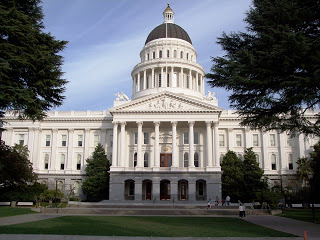Beginning Friday, Amazon.com and other large out-of-state retailers will be required to collect sales taxes on purchases that their California customers make online.
 |
| California Capitol, Sacramento – Wiki Commons |
Marc Lifsher
Los Angeles Times
Sacramento – Shopping at Amazon.com Inc. and other major Internet stores is poised to get more expensive.
Beginning Friday, a new state law will require large out-of-state retailers to collect sales taxes on purchases that their California customers make on the Internet — a prospect eased only slightly by a 1-percentage-point drop in the tax that also takes effect at the same time.
Getting the taxes, which consumers typically don’t pay to the state if online merchants don’t charge them, is “a common-sense idea,” said Gov. Jerry Brown, who signed the legislation into law Wednesday.
The new tax collection requirement — part of budget-related legislation — is expected to raise an estimated $317 million a year in new state and local government revenue.
But those taxes may come with a price. Amazon and online retailer Overstock.com Inc. told thousands of California Internet marketing affiliates that they will stop paying commissions for referrals of so-called click-through customers.
That’s because the new requirement applies only to online sellers based out of state that have some connection to California, such as workers, warehouses or offices here.
Both Amazon in Seattle and Overstock in Salt Lake City have told affiliates that they would have to move to another state if they wanted to continue earning commissions for referring customers.
“We oppose this bill because it is unconstitutional and counterproductive,” Amazon wrote its California business partners Wednesday. Amazon has not indicated what further actions it might take to challenge the California law.
Many of about 25,000 affiliates in California, especially larger ones with dozens of employees, are likely to leave the state, said Rebecca Madigan, executive director of trade group Performance Marketing Assn. The affiliates combined paid $152 million in state income taxes last year, she pointed out.
“We have to consider it,” said Loren Bendele, chief executive of Savings.com, a West Los Angeles website that links viewers to hundreds of money-saving deals. “It does not look good for our business.”
The larger bite from buyers’ pocketbooks will be eased only a bit because California’s basic sales tax rate also will drop to 7.75% on Friday when a 2-year-old temporary increase expires. The basic rate in the city of Los Angeles falls back to 8.75%.
Brown’s signature on the budget bills is aimed at closing a loophole that freed Amazon and other out-of-state retailers from collecting sales taxes for California.

Not collecting sales taxes gave Internet retailers a competitive price advantage over California’s small businesses such as independent booksellers and big-box retailers with a presence in the state, including Barnes & Noble Inc., Wal-Mart Stores Inc., Best Buy Co. and Target Corp.
“You can’t give one segment of retail a 10% discount every day. It’s just not fair,” said Bill Dombrowski, president of the California Retailers Assn., a major player in a coalition of large and small stores supporting the legislation.
California’s new requirement will generate badly needed state revenue and send a signal to Congress that “we want to see a national solution” to the issue of taxing Internet sales, Dombrowski said.
California is the seventh and largest state in the country to pass a law to collect taxes on out-of-state Internet sales. Illinois, Arkansas and Connecticut acted earlier this year, North Carolina and Rhode Island in 2009 and New York in 2008. Amazon sued to overturn the New York law and lost in the lower courts. The company is paying sales taxes into an escrow account pending an appeal.
Other states currently are considering similar sales tax collection bills.
California’s new law was drafted to circumvent a 1992 U.S. Supreme Court ruling that sellers can’t be forced to collect sales taxes unless they have a physical presence in the state.
The new statute would establish that presence in two ways: when sellers pay commissions to other Internet sites in California, known as affiliates, that refer buyers; and when sellers have a related company operating in the state.
Amazon has thousands of such affiliates in California. It also has related business operations that include Lab126 Inc. in Cupertino, which develops Kindle electronic book readers, and a Studio City office for its Internet Movie Database unit.
One affiliate, Ken Rockwell of San Diego, the owner of a 12-year-old photography website, said he planned to move out of state.
“Will it be Las Vegas or Scottsdale or Ensenada?” he said. “It’s a question of where, not if.”
linkwithin_text=’Related Articles:’


Be the first to comment on "California tells online retailers to start collecting sales taxes from customers"